Margaret Fleming murder: 'My incredible encounter with her killers'
It was a grey day in November 2016 when I answered a call from my newsdesk. As a duty reporter I could be assigned anything, and on this particular day I was asked to look into a missing person's case.
That wasn't unusual, but as the story unfolded it became the most incredible I'd worked on.
Along with a cameraman, I headed to the coastal village of Inverkip where police were appealing for information about Margaret Fleming.
She was a young woman who hadn't been seen for 17 years by anyone other than her carers, Eddie Cairney and Avril Jones.
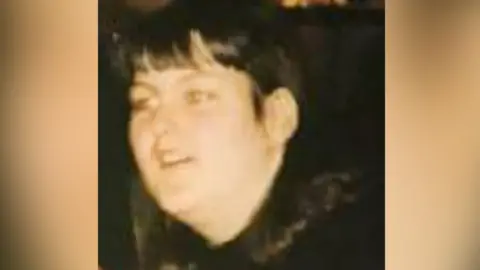
From December 1999 there had been no record of Margaret having seen a doctor, she had never used a bank account and there was no evidence she was on social media.
In my career as a reporter, I've done several missing persons cases - but none that sounded like this. How could someone be alive but live undetected for all that time?
I followed the story in the months that passed and despite several appeals by Police Scotland there remained no sight nor sound of Margaret.
Then in October 2017 - almost a year on from the reported disappearance - I was handed an opportunity to interview Cairney and Jones at Seacroft, the home they had shared with Margaret.
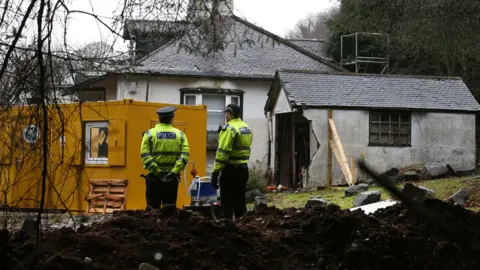 PA
PAThe day was as extraordinary as the case itself.
The house was in a stunning location, looking out to the Firth of Clyde. The property appeared derelict from the outside, but inside it was worse.
For me and cameraman Stan Leech, the first thing to hit us was the terrible smell.
The floorboards creaked, plaster was coming off the ceiling and in the back room there was a huge hole in the house with only tarpaulin between the garden and the interior. I can't imagine how cold winter must have been.
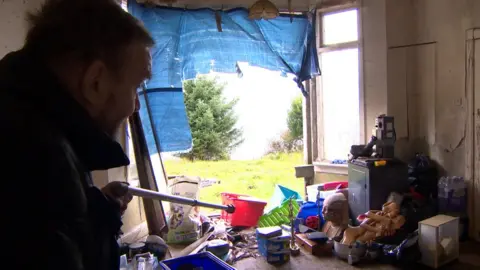
Jones was quiet and said she wasn't feeling well. Cairney was very talkative, bullish even. He appeared outraged that police seemed to be treating them as suspects.
The interview began with that standard question - how do you feel?
And what came back was an unsurprising answer: "We're upset at the way we've been treated, we feel like suspects, the last year has been hell."
'She's alive and working as a gangmaster'
But then the conversation took an incredible turn.
My next question, asking whether the pair had heard from Margaret, prompted the reply: "Oh yes, she's alive and working as a gangmaster in Poland."
Do you mean she's working under a gangmaster? I asked.
"No, no - she is the gangmaster," came the reply.
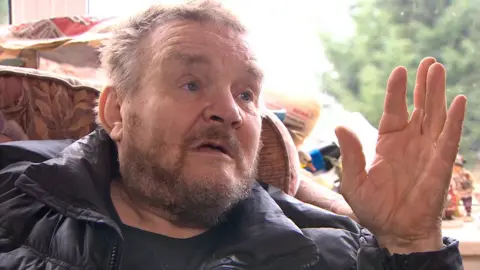
Now, this was a woman whose learning difficulties were so complex she couldn't manage her financial affairs.
Some of the things Cairney said about Margaret were unrepeatable, unkind and distasteful.
But the most telling moment was when I asked Jones what she would like to say to Margaret if she was watching now?
This is a question I ask in a lot of missing persons cases, as interviewees are nervous and getting them to describe a loved one is straightforward and puts them at ease.
Jones was silent - not a word passed her lips.
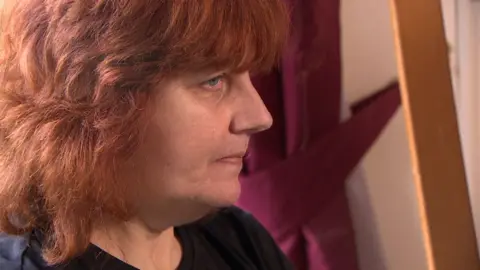
Eventually, the interview was over and we packed up our kit and left the house.
As we drove onto the A78 back to the office, I asked Stan what he thought. "Well, that was strange," he replied.
We both agreed it was one of the most bizarre days we'd had at work.
Did we believe them? Some of it yes - some of it no.
Cairney said he'd been a deep sea diver, and that seems undisputed.
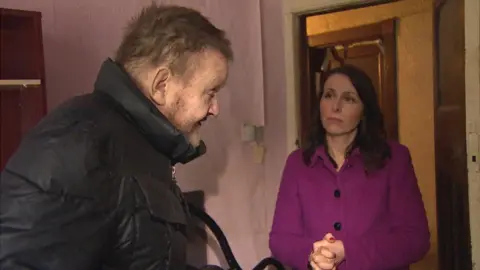
But when he said he'd spoken to Margaret recently and I asked if he'd told the police, he insisted that they weren't interested.
To me, that just wasn't credible.
The interview was broadcast the following day and not long after that, Cairney and Jones were arrested.
Called to give evidence
The next time I saw them in the flesh they were in the dock at the High Court in Glasgow and I was in the witness box.
I was called by the prosecution to give evidence during their trial and I looked on as my interview was played for the jury.
It was an uncomfortable experience for a reporter who is used to sitting in the press gallery.
It was hard to look at them, but I did steal a peek at one point. Cairney looked very frail and Jones looked far away, as if she was disconnected from events.
Now they stand convicted of Margaret's murder. The jury clearly did not believe their version of events.
The police and prosecutors have done their job. Justice has been served for her family.
But one question remains - where is Margaret Fleming's body?
